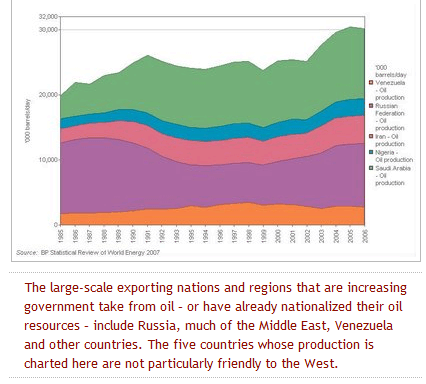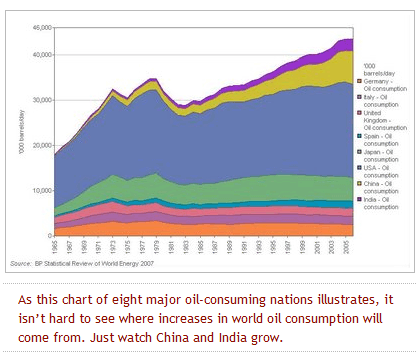|
TUESDAY EDITION January 6th, 2026 |
|
Home :: Archives :: Contact |
 |
Pricing the Marginal Barrel of OilPeter McKenzie-BrownEmail: pmbcomm@hotmail.com languageinstinct.blogspot.com November 2, 2007  Five of the world’s large oil exporters have two things besides big oil reserves in common. First, their economies are largely dependent on revenues from energy production – they don’t produce much else. Second, their people or their governments (or both) are hostile to the West.
Five of the world’s large oil exporters have two things besides big oil reserves in common. First, their economies are largely dependent on revenues from energy production – they don’t produce much else. Second, their people or their governments (or both) are hostile to the West.
The chart shows the relative positions of five of the world’s large producers – Venezuela, Russia, Iran, Nigeria and Saudi Arabia. Consider the context: the planet consumes about 85 million barrels a day. Together, these five countries produce more than one third of world supply. Except for post-Soviet Russia, which is new to the game, each of these countries long ago found ways to maximize government revenue from petroleum. Perversely, in the long run this will serve them well by making less production available. As prices rise, their economies will boom long after their production has gone into decline. As the world nears its petroleum peak, the economic reality of a seller’s market will have strange, unintended consequences. Economic Dependency: Consider the first of the two points I raised. The countries named in the chart have little to keep their economies going except revenue from oil and gas. Here are the numbers. The info comes from many sources, but I’ve done my best to keep it consistent.
No matter how much they protest the importance of oil at “reasonable” levels, these countries are delighted when the price of the marginal barrel of oil – that is, the price of the last barrel sold – goes up. Higher marginal prices enable them to charge more for the barrels they load onto tankers. Nothing new here. However, at a recent energy conference in London, Sadad Al-Husseini – an oil consultant and former executive at Saudi Arabia’s national oil company - made an observation that puts the reality of this economic dependency in an interesting light. In effect, he quantified the price of the marginal barrel when he suggested that supply shortages will add $12 to the price for every million barrels a day of additional global demand.  Of course, supply and demand are parts of the same equation. Let’s assume that $12 is the cost of adding another million barrels of demand. It would also be the price of subtracting a million barrels of supply. Cutting supply by one million barrels a day would jack prices up by $12 per barrel as effectively as would increasing demand by that amount. While the marginal price is increasing from a growing Asia, it could also increase because of reductions in supply. If the five producing countries I have been discussing were to cut supply by a million barrels per day, we would likely see yet a price increase of the same magnitude. Consider the math: Today’s marginal barrel is worth about $90. If our five countries collectively reduced production by 5 per cent, their revenue per barrel would increase by 15 per cent, as oil rose to $102 per barrel. Their collective revenues would benefit quite nicely, thank you very much. How could such a reduction occur? These countries wouldn’t need an OPEC agreement to reduce production – you may have noticed that none of the OPEC members are producing their full quotas anyhow. They could effectively reduce production through failure to explore for and develop reserves, by shoddy production practices, by simple government fiat, or as a result of the natural depletion of their reservoirs. However, the result would be that countries with little else to offer could increase government coffers and national wealth. Hostility to the West: At the beginning of this post, I noted that each of these countries has a certain amount of hostility to the west, and each in its special way.
My basic assumption is that the spectre of peak oil is imminent. As a result, and because of high prices, governments around the world are increasing their take from oil and gas. Alberta is by no means alone in this. Increased government take does not increase oil production – in practice, it decreases the incentive and ability for oil companies to bring more oil on stream. Less production, higher prices: it's a simple matter of supply and demand. In a response to my article, a correspondent told me that “The sooner we get away from the dirty polluting tar sands, the better it will be for the environment and the people of this planet.” I think that if the 1,250,000 daily barrels of oil that now come from Canada's oil sands suddenly evaporated, you and I would both be dealing with oil well beyond $100 per barrel, right now. Most consumers in the West can pay the extra money for gasoline that such an increase in oil prices would generate, although most of us have had to tighten our belts to do so. However, rising prices are already causing a great deal of suffering around the world – especially in the poorer countries. The world is hooked on oil, which is not good. However, as long as we are hooked, we must find ways to keep those supplies of oil coming while we look for solutions. Increased government take makes it more difficult to develop supply. Increased take by countries whose governments or people are openly hostile to the West is a danger we cannot resolve, but it is also a danger we must not ignore. Peter McKenzie-Brown Email: pmbcomm@gmail.com languageinstinct.blogspot.com November 2, 2007 |
| Home :: Archives :: Contact |
TUESDAY EDITION January 6th, 2026 © 2026 321energy.com |
|